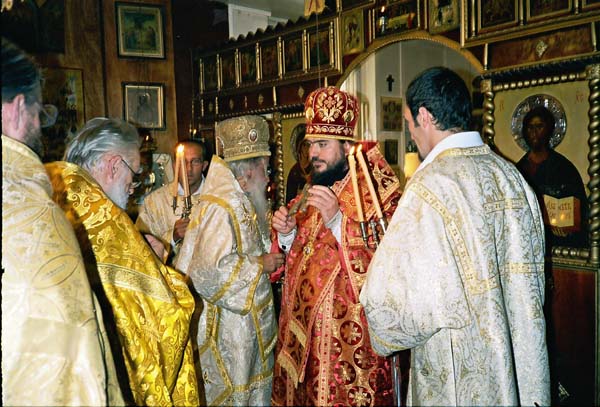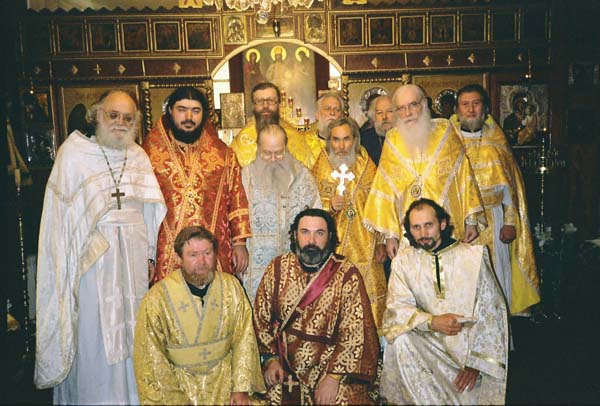|
Consecrations Of ROCA (V) Bishops
From the 28th
to the 30th of June, the parishioners of the Paris Cathedral of All the
Saints Who Shone Forth In the Russian Land were witnesses to extraordinarily
remarkable historic events Ч the consecrations of new bishops for Russia.
Apparently, these were the first episcopal consecrations to take place in
this cathedral throughout the entire duration of its history, beginning from
the moment when it was first blessed by Bishop Ioann of Shanghai. All know what sort of obstacles can be created by the enemy of mankind, in order to prevent this blessed event from transpiring. Therefore, some time prior to these happenings, Fr. Veniamin, together with his parishioners, began to serve akathists before the ikon of the Mother of God, imploring Her protective intercession; Batiushka also requested, from the amvon, that his parishioners intensify their prayers. But, despite the many difficulties connected with the arrival (in part, Archbishop Varnava, Bishop Sergii and Deacon Andrey were held up in transit), on Friday, June 27th, Bp. Varfolomey of Grenada and all three episcopal candidates chosen by the ROCA (V) Sobor, together with those accompanying them, participated in the evening service in commemoration of Saint Iona, the Metropolitan of Moscow. On Saturday, June 28, on the morning prior to the service, Vl. Varnava of Cannes and Europe appointed the Moldavian Archimandrite Antony (Rudey) to be the Bishop of Beltsk Ч and his vicar. In his homily on the appointment, Fr. Antony said: "There is nothing [... more] holy and precious on earth than the Barque of Christ Ч the Church Ч the saviour of human souls. Naked and poor come we into the world, where, thanks to the Lord God, we can find consolation only in the Church, which Saint Seraphim of Sarov called a little corner of Paradise on earth... Divine Providence has granted that we, infirm and weak-natured though we are, might have, in our midst, His Eminence, Metropolitan Vitaly, God's chosen one, who is responsible for the renascence of the true confessing Church, against which the gates of hell shall not prevail. "There have been persecutions, there are and shall be, but the Bride of Christ will triumph throughout the ages." Fr. Antony is young (being 34 years of age), but he is already a restrained and reserved monk who, in the not too distant past, managed, together with his parishioners, to defend his church from the pretensions of the MP; not only was he not seduced by the arbitrary proposal made to him by Archbp. Lazar, to become one of the latter's bishops, but he also came under the omofor of Vl. Varnava of Cannes and Europe. During [the service of] the Hours, Vladyka Varnava tonsured Ioann Savchenko (the starosta [warden] of the cathedral, and assistant to Fr. Viktor Pivovarov), who had arrived from Slaviansk-in-Kuban, as reader and sub-deacon. The Liturgy was served by Archbishop Varnava of Cannes, together with Bp. Varfolomey of Grenada and the following clergy: mitred protopriest Veniamin Joukoff, prot. Radu Apostolescu, priest Nikolai Apostolescu (Paris), prot. Nikolai Semenov (Brussels), hieromonk Anastasy (Surzhik [Vladivostok]), priest Viktor Pivovarov (Slaviansk-in-Kuban) and readers Vladimir Lysenko (Lyons) and Ioann Bir (Paris). It should be added that the tiny altar of the Paris cathedral could barely accomodate such a number of people, for there were also acolytes, and the day was hot, on top of that. Even the air-conditioners, specially set up for these solemnities in the cathedral, did not succeed in saving the situation.
During the
liturgy, Fr. Antony
was consecrated as the Bishop of Beltz, over whom Vladykas Varnava and
Varfolomey performed the laying-on of their hands. Likewise, prot. Radu
Apostolescu was awarded a golden pectoral cross for his many years of
service, and sub-deacon Ioann Savchenko was elevated to deacon by him.
During the liturgy there were not a few people praying and receiving
communion. In his sermon, Archbishop Varnava said that a rare solemnity had
taken place Ч the consecration of a new bishop for the Orthodox Church; he
also recalled that he himself had been consecrated in 1982, with the aim of
passing on undistorted episcopal grace to the Russian people, and that not
all the hopes and expectations which existed then, had come to pass; but now
a new bishop Ч Antony
Ч has been appointed for Russia, who is returning to his native Moldavia in
order to serve his flock, which, despite enslavement by the communists, has
preserved both its piety and its traditions.
On Saturday
evening, June 28th, hieromonk Anastasy
served an all-night vigil in honour of All the Saints Who Shone Forth In the
Russian Land Ч the parish feast of the Paris cathedral. On the eve of that
day, yet another guest arrived from Los Angeles (California) Ч Fr. Nikita
Orlov. During the night of Saturday the 28th into Sunday the 29th of June, Bishop Sergii of Mansonville arrived with his deacon, Andrey Lomov. Due to unforeseen circumstances, they had been held up along the way and had been forced to spend the entire night at the airport. On Sunday, prior to the service, hieromonk Anastasy was appointed to be the Bishop of Vladivostok and the Far East. In his speech, Fr. Anastasy said that in these, our last days, the lack of hierarchical service is being felt as never before Ч the harvest is great, but the workers are few Ч and that these words of the Saviour are what compelled him to accept this labour. But, also being restored as a result of this event, is the hierarchical cathedra of Vladivostok, which was the oldest in ROCA (since 1920), and from which other eparchies, such as those of Harbin and Kamchatka, were subsequently carved out. But, in addition to that, as Fr. Anastasy stated, Vladivostok became the last bastion of the White Movement in the Russian land, and it was here that the last Zemskii Sobor [Land Council] took place in 1922, at which those who took part in it bore witness, before the entire world, that the only legitimate authority in Russia must be an Orthodox Monarchy. Then, Vladykas Varfolomey, Sergii, and Antony and the clergy served a Divine Liturgy, during which hieromonk Anastasy was consecrated as Bishop. Bishop Anastasy is over 50 years old. In addition to receiving a higher pedagogical education, he also completed a course of studies at a spiritual academy and organized a parish in Vladivostok. But, having gotten to know the iniquity [or: falsehood] of the MP, he came over to ROCA. He was a candidate to become a Bishop prior to the crisis that befell ROCA, but there was a bit of difficulty with the consecration Ч such opponents of the MP as himself were undesirable to some of the Synodalists. Later, an offer also came from the "Russian Hierarchs" Ч to become a Bishop with them, but Fr. Anastasy, having become aware that this action was a willful one, surrendered his ticket to Odessa and decided not to participate in it. Many guests arrived for the parish feastday, in particular, from Brussels, from Fr. Nikolai Semenov's parish; many people received communion. It fell out to Fr. Nikita Orlov to deliver the sermon on this feast. His powerful homily was about the holy God-pleasers of Russia, Ч whom we are all obliged to emulate, Ч all of whom had three identical qualities: being confessors of the Faith, loving God without any compromises, and taking their cross upon themselves. Then a moleben was served before the cathedral ikon of All the Saints Who Shone Forth In the Russian Land. Many years were expressed to Metropolitan Vitaly, the episcopate, and the clergy Ч and Memory Eternal to the reposed hierarchs of the Russian Church Abroad; and, in part upon the initiative of Bp. Anastasy, to the ever-memorable hierarchs of the eparchy of Vladivostok. Upon the conclusion of the liturgy, a bounteous repast, which had been prepared by the sisterhood, headed by Matushka Olga Joukova, awaited all those desirous of partaking of it, Ч the parish hall was packed to overflowing. Greetings and speeches of thanksgiving were delivered by Fr. Veniamin, the rector of the cathedral; by starosta Pavel von Benigsen; by Arkady, a guest from Moldavia and Bp. Antony's assistant; by prot. Nikolai Semenov, and others. Fr. Veniamin, having heard "O Holy God" being sung in Moldavian during the liturgy by Vl. Antony and Arkady, asked them to sing it one more time at table, where they were accompanied by the Rumanian Fr. Radu Apostolescu (the Moldavian language is practically indistinguishable from Rumanian). Later, they were asked, time and time again, to repeat the melody that had caught everyone's fancy. The guests felt both the degree to which the cathedral, founded by St. Ioann [of Shanghai], had been steeped in prayer, and the grace of God, sent in copious measure for the sake of the episcopal consecrations, as well as Russian warmth and hospitality.
The monastic
tonsure of Fr. Viktor Pivovarov was planned, along toward evening, when many
had departed. He was tonsured by Vladyka Sergii. Those few who remained
were witnesses of a sacramental mystery unusual in our lukewarm days, the
sweet tenderness and poignancy of which it is impossible to put into words.
Vladyka Sergii read quietly and without haste, but each of his serene words
reached the heart. Although Fr. Viktor was left his former name, it was now
in honour of another saint Ч in honour of New-Martyr Viktor (Ostrovidov),
a fiery fighter against sergianism. Following the liturgy, after the singing of "O Holy God," Bishops Varfolomey, Sergii, Antony, and Anastasy performed the laying-on of their hands upon Fr. Viktor's head and transfered episcopal grace to him. After the consecration, five hierarchs now served the liturgy. Bishop Viktor is over 60 years old. In his day, he studied in a spiritual academy, together with Fr. Lev Lebedev, being a friend of the latter; but he was forced to leave the academy because he refused to become a KGB informer. At the start of the 1990s, Vladyka Varnava ordained him a priest. Vladyka Viktor is a spiritual writer; his work has been extensively published in newspapers and magazines and, in 2002, his book, "The Apocalypse and Our Times," which he obligingly distributed to those desirous of obtaining a copy, was published [in Russian]. Upon the conclusion of the divine service, the tables were all well laden and none went away hungry. Later, the guests were shown Paris and its environs. It should be mentioned that not a little effort was put forth by those parish labourers who prepared the guest-rooms in the parish hall and helped the latter to move in. Of course, these four days were filled full of mutual contacts, with the bishops, clergy and laity becoming better acquainted and making friends. There were many conversations concerning church subjects and, what was particularly gratifying was that people living in different countries revealed a total similarity in their ecclesiastical world view, the guarantee of fruitful joint activity in the future.
Truly, the
merciful Lord has given us a time full of grace to work in His meadow, as
Fr. Veniamin said during the akathis to the Mother of God, soon after the
conclusion of these solemnities.
|


